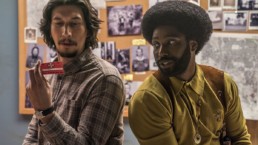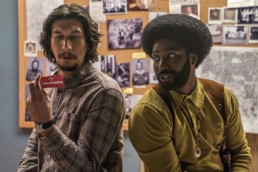‘BlacKkKlansman’ Review: Infiltrating the KKK From the Inside Out
This is a custom heading element.
Almost all of the articles and paranoia one sees in the news today orbits around one question: if the divide between all of us in this country does not cease, is there a civil war on the horizon?
In a strangely optimistic way, I believe that it has already begun. It is Hollywood versus the Oval Office, and for the sake of all of us, I hope it remains that way. BlacKkKlansman, the latest movie by American cinematic icon Spike Lee, is a cultural waterloo in the unfortunately present cold civil war. It is a searching movie that somehow manages to also be marquee Hollywood entertainment in a lusciously old-school way.
The setting and cinematography conjure up feelings of Brian De Palma at his best in films like Blow Out. Clever usage of the filmic language, and a deliciously deliberate pace, truly make it feel like a Hollywood gem that has been lost in the age of CGI-everything movies. Like a similarly-Jordan-Peele involved property (Get Out), it also manages to be an incisive look at the nature of our times, and unflappably holds up the mirror. Beyond a few small moments where Spike gets a little too heavy-handed with of-the-moment melodrama, BlacKkKlansman will surely be placed as a cultural touchstone about the contentious times in which we live. It is also quite simply, an absolute treat.
BlacKkKlansman is based on the remarkable true story of Ron Stallworth (John David Washington), a black Colorado Springs cop who infiltrates the Ku Klux Klan. Although Ron convinces head Klan honchos of his legitimacy over the phone, including David Duke (Topher Grace), he has a certain pigment problem when it comes to going fully undercover. He enlists the help of another detective, a Jewish officer named Flip Zimmerman (Adam Driver), to go undercover as a contiguous Ron Stallworth. Flip is a good cop, but butts heads with Ron as Ron feels that he isn’t treating the investigation as though he has “skin in the game.”
As Ron comes to grips with being the first black cop in Colorado Springs, he probes some of the deepest complexities of the black struggle for equality and dignity. He finds himself agreeing with Kwame Ture (Corey Hawkins), a notable black revolutionary who Ron is sent undercover to surveil. While there, he comedically attempts to stifle his enthusiasm. As he describes later, he feels conflicted between his identity as a “black man and an American.” This reaches its apex with his relationship to his college-attending girlfriend Connie (Ashlie Atkinson), who struggles with Ron’s transparent goodness despite the fact that he is a “pig.”
The only hope for a better future is productive conversation at the dinner table fostered from movies such as this.
The film derives its most relevant merit from the way it honestly shows Ron going through the ideological uncertainty of his time, but still chugging forth in trying to ‘do the right thing’ no matter how confusing. Torn by a plurality of allegiances, it is clear he wants to fight the true villains while bringing a coalition together of people who are seeking to make a better world. At one point, Ron inquires to Kwame if it would really take picking up arms to liberate black people, and he has trepidation upon his reply. Ron wants to find a way out from the violence, yet the Sisyphean struggle for black equality has him routinely brushing with complete disillusionment.
The later writings of Martin Luther King Jr. in Where Do We Go From Here seem to resonate in the present, especially the passages where King expresses his understanding of the rise of the Black Panthers. He writes eloquently about how the strides he made in the peaceful struggle for equality seemed nebulous in the face of governmental stalling of justice. He implored African-Americans to have faith in the peaceful struggle for a better world, but he also had a deep compassion for those who felt enraged by the promise of progress and it’s crippled delivery. Stallworth seems to mirror King in the movie, and by joining the police force, seems to be in search of a third way. His third way includes fighting the true villains and building a coalition of people who are mostly on the same side. The true third way for Ron may very well be telling stories like these to bring us together.
BlacKkKlansman will divide many, and there will surely be those who accuse Spike of attaching footage from the Charlottesville disaster at the end of the movie as being too ‘heavy-handed.’ Even if you are a Trump supporter, you must admit we live in a heavy-handed era, and Trump is so on the nose he might as well have crawled through to the other side of your face. BlacKkKlansman is a cathartic film that invites the audience to consider the complexities of a situation so incendiary that a mere glance would make it catch fire. It implores the audience to reflect on whiteness, blackness, and every shade of grey that mitigates the interactions of both. The only hope for a better future is productive conversation at the dinner table fostered from movies such as this. Although Spike Lee may very well contend through this film that it is one step forward followed by 1,000 steps back, he also contends that we must be moving forward. It is the only way.
BlacKkKlansman is rated R for language throughout, including racial epithets, and for disturbing/violent material and some sexual references. 135 minutes. Opening this Friday in theaters everywhere.


